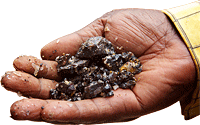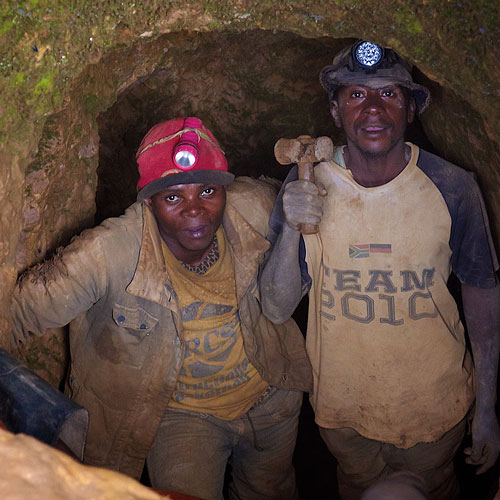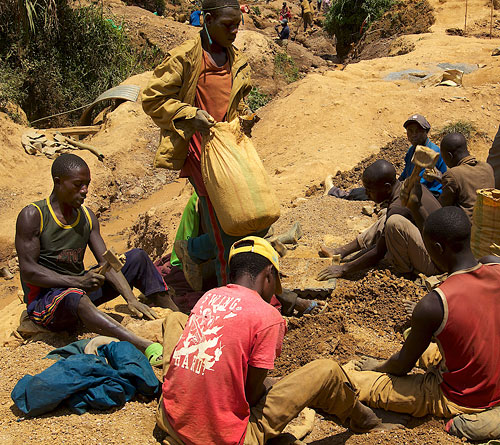“Blood minerals” in your camera? Report details electronics companies’ progress on conflict minerals
posted Friday, August 17, 2012 at 12:52 AM EDT
 Chances are you've heard of blood diamonds, also known as conflict diamonds. The term's pretty well understood--diamonds mined in war-stricken areas may be supplied by unscrupulous types who're not averse to using torture, slavery, or worse to achieve their goal. The more stones they can get out of the ground, the more money they have to fund an oppressive regime, or simply to line their own pockets. Conflict diamonds are well-known in part because they've featured prominently in popular culture, including an Oscar-nominated movie starring Leonardo DiCaprio.
Chances are you've heard of blood diamonds, also known as conflict diamonds. The term's pretty well understood--diamonds mined in war-stricken areas may be supplied by unscrupulous types who're not averse to using torture, slavery, or worse to achieve their goal. The more stones they can get out of the ground, the more money they have to fund an oppressive regime, or simply to line their own pockets. Conflict diamonds are well-known in part because they've featured prominently in popular culture, including an Oscar-nominated movie starring Leonardo DiCaprio.
You might not be so familiar with the concept of conflict minerals, though--and depending upon the companies with which you're doing business, you might well be unknowingly using what could be termed "blood electronics". Some companies--encouraged by campaigns like the Center for American Progress' Enough Project--are starting to take some important steps to avoid that possibility.
Photo courtesy of the Enough Project / Sasha Lezhnev.
So--what are conflict minerals? Well, it's not just diamonds that are rare. Many of the electronic products we take for granted rely on relatively scarce metals, and even those which aren't so scarce can sometimes come from mines in areas of conflict. There are three main minerals supplying those metals: cassiterite (for tin), columbite-tantalite (for tantalum), and wolframite (for tungsten).
Of the three, tin is the most abundant, and is commonly used in solders. Unfortunately, while there are much more abundant sources in other countries, about 4% of global production comes from a militia-controlled mine in the Democratic Republic of the Congo. Some tantalum--most used in the production of capacitors--is also produced in the Congo. So too is tungsten, best known for its use in incandescent lightbulbs.
While some countries including the US are working to enact laws controlling their use, the wheels of government can turn excruciatingly slow. You might think that the answer would simply be to stop Congolese trade of these metals and their ores, but it's not that simple. Conflict minerals can be passed through middlemen to neighboring countries, and not all production in the Congo is necessarily supporting conflict, either. In fact, the opposite is true, and by banning trade altogether for these metals, we'd effectively be removing the livelihood of those at legitimate mines.
The answer, in part, is for companies using these metals to trace their sources, allow outside auditors to verify the information, and provide this information to the buying public so that they can avoid buying conflict electronics. That is exactly what's happening at some of the world's leading electronics manufacturers and a report just released by the Enough Project casts a critical eye over these efforts.
Photo courtesy of the Enough Project / Sasha Lezhnev.
You can read the full report (in PDF format) on the Enough Project website. It's clear that this is an evolving issue in the tech industry, and various companies (notably Intel and HP) are farther down the road in developing policies to address it.
Until manufacturers make clear their conflict minerals supply chain and whether their sources have been audited, it might seem there's not a lot the buying public can yet do. That's not entirely the case, though. For one thing, you can make clear to the manufacturers with which you do business that you see this as a crucial issue, and one in which you want to see them leading the way in their respective fields. For another, you can offer your support to organizations working to raise awareness of this issue--and that's not just the Enough Project. A list of these organizations can be found at the end of the Wikipedia article on conflict minerals, and we're sure any one of them would appreciate your donations. And last of all, you can spread the word to friends, family and colleagues--make them aware of conflict minerals, and just why they're an important issue.
To those companies who've already taken significant action on conflict minerals, keep up the good work. We encourage others to continue their work on solutions to address the problem.
Press Release
Intel, HP Rank Highest on Conflict Minerals, Nintendo, HTC Lag Behind
Date: Aug 16, 2012
FOR IMMEDIATE RELEASE
WASHINGTON – In response to growing consumer demand for electronics products free of conflict minerals from eastern Congo, the Enough Project issued its second company rankings report, “Taking Conflict Out of Consumer Gadgets: Company Rankings on Conflict Minerals 2012,” which assesses consumer electronics companies on their progress toward responsible and conflict-free supply chains.
The report found that four leading electronics companies—Intel, HP, Motorola Solutions, and Apple[ii]—have established conflict minerals programs that pave the way for the rest of the industry. Six other companies—SanDisk, Philips, Sony, Panasonic, RIM, and AMD—significantly improved their conflict free efforts by tracing back into their supply chains, piloting due diligence, and joining a smelter audit program. On the other end of the spectrum, Nintendo remains at the bottom of the list and has yet to make any known effort to trace or audit its supply chain, despite growing public awareness.
“HP and Intel have gone above and beyond the call of duty on conflict minerals,” said Sasha Lezhnev, co-author of the report and Enough Project Senior Policy Analyst. “It is now time to level the playing field for all companies, and the Securities and Exchange Commission has a key role to play in its upcoming vote on the rules for the conflict minerals law on August 22. The SEC should ensure that retailers and all firms that use the minerals are covered by the rules and that there is not a long phase-in period. Otherwise, the Intels and HPs will be left unfairly holding the bag for a problem that belongs to thousands of companies that have been turning a blind eye to this problem for years.”
The report builds on the Enough Project’s first company rankings report that was released in December 2010. The report’s objective is to rate consumer electronics companies on their efforts to positively invest in the region, as well as their efforts to remove conflict minerals—tin, tantalum, tungsten, and gold—that fund armed groups in eastern Congo from their supply chains. The minerals are used in electronic devices and are a key driver to the war, which has claimed 5.4 million lives. The rankings are designed to help provide consumers with information to make responsible and informed choices when purchasing electronics products.
“Moving forward, we need to ensure that conflict-free mining does not equate to Congo-free mining,” said actor and ethical mining entrepreneur Jeffrey Wright, who is featured in a new Enough Project video about conflict-free mining. “Companies sourcing minerals from eastern Congo can invest in a way that serves both their own interests and the interests of local communities. To help achieve this, more firms should join the Public-Private Alliance for Responsible Minerals Trade, invest in projects to source clean minerals in eastern Congo, and support social development initiatives in mining communities to foster sustained economic growth and long-term stability.”
The 2012 rankings show an overall trend of improvement among electronics companies to address conflict minerals in their supply chains, but less progress in other industries, including jewelry, automotive, and industrial machinery. The progress has been spurred by the conflict minerals provision in the Dodd-Frank financial reform legislation, as well as by growing consumer activism.
"Much of the progress that has been made by electronics companies on conflict minerals can be attributed to direct consumer action. We are witnessing a mass consumer movement for the creation of a clean minerals sector in Congo. Not surprisingly, college students have emerged as the leading activists on this issue. Students from more than 100 college campuses across the U.S. and U.K. are advocating for their university's purchasing and investment policies to reflect company action on conflict minerals," said co-author of the report and Enough Project Student Coordinator Alexandra Hellmuth.
In addition to assessing electronics industry leaders and laggards, the report identifies three main areas of progress that have been made industry-wide—tracing, auditing, and certification—as well as significant gaps in conflict minerals policies that must be addressed.
“The progress made by the electronics companies in the Enough Project’s rankings now needs to be duplicated by companies in other sectors,” said Enough Project Executive Director John C. Bradshaw. “Companies in the jewelry, automotive, industrial machinery, and aerospace industries should join the Public Private Alliance for Responsible Minerals Trade and begin direct sourcing programs to help Congo develop a clean minerals trade.”
Read the full report: “Taking Conflict Out of Consumer Gadgets: Company Rankings on Conflict Minerals 2012.”
View a slideshow of images from the report and eastern Congo. Photos are free for media use. Please credit the Enough Project.
View a new Enough Project video about conflict-free mining that features actor and ethical mining entrepreneur Jeffrey Wright.
###
Enough is a project of the Center for American Progress to end genocide and crimes against humanity. Founded in 2007, the Enough Project focuses on crises in Sudan, eastern Congo, and areas of Africa affected by the Lord’s Resistance Army. Enough’s strategy papers and briefings provide sharp field analysis and targeted policy recommendations based on a “3P” crisis response strategy: promoting durable peace, providing civilian protection, and punishing perpetrators of atrocities. Enough works with concerned citizens, advocates, and policy makers to prevent, mitigate, and resolve these crises. For more information, please visit www.enoughproject.org.
Motorola Solutions was not ranked in the Enough Project’s 2012 survey because the company split and is no longer producing one of the five key products included in the rankings. However, Motorola Solutions has been a prominent leader on tracing, auditing, and certification.
[ii] Although Apple ranked number eight in the Enough Project’s 2012 company rankings report, Apple has been an industry leader by being the first company to identify the number of its smelters and to require its suppliers to use only certified conflict-free smelters once audits are complete.

